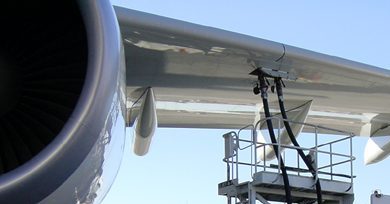With an aviation industry-wide goal to cap net greenhouse gas growth from 2020 onward, renewable jet fuel is a key aspect of some airlines’ sustainability strategies, and two big announcements this week underscored that fact. United Airlines plans to reduce greenhouse gas emissions by 50% by 2050, while JetBlue will be receiving its five new A321 aircrafts from the Airbus plant in Mobile, Ala., powered with renewable jet fuel blend.
To reach its goal, United Airlines will continue investing in newer, more fuel-efficient aircraft, implementing operational changes to conserve fuel, and expanding its use of more sustainable aviation biofuels, the company said.
The airline punctuated its announcement with a flight from San Francisco to Zurich using its most fuel-efficient aircraft – the Boeing 787 – fueled by a 30/70 blend of biofuel and conventional jet fuel. The biofuel comes from World Energy’s AltAir Fuels and is made from Carinata seeds from agri-tech company Agrisoma Biosciences Inc. The seeds are crushed to recover the oil and refined into jet fuel.
JetBlue has launched a series of flights powered in part by renewable jet fuel blend: the airline’s first use of the blend was for the delivery of its latest A321 aircraft from Airbus, with four more A321 aircraft coming from Airbus to follow throughout the rest of the year. The delivery flights will all use 15.5% renewable jet fuel blended with traditional jet fuel. The fuel is provided by Airbus and certified by Air BP.
JetBlue CEO Robin Hayes says the company’s goal is “to serve as a market-maker for renewable jet fuel, creating demand and therefore supporting supply.” The airline is actively working with Airbus to set up infrastructure for more options in the southeast region, Hayes adds.
Since May 2016, Airbus has offered customers the option of taking delivery of new aircraft from Toulouse, France, using a blend of sustainable jet fuel. Following the deliveries to JetBlue, Airbus will determine the next steps toward offering this option to more customers taking aircraft deliveries from Mobile. Longer term, Airbus envisions supporting industrial production of sustainable fuels for aviation in the southeastern US.
Industry Goals
The International Civil Aviation Organization (ICAO), a UN specialized agency, adopted major environmental goals in 2004, including goals of limiting or reducing the impact of aviation emissions on local air quality and limiting or reducing the impact of aviation greenhouse gas emissions on the global climate.
The organization developed a range of standards, policies and guidance material to address these issues, including technological improvements, operating procedures, proper organization of air traffic, appropriate airport and land-use planning, and the use of market-based options. “All of this has contributed to aircraft operations that today can be 70% more efficient than in the 1970s,” the organization states…



